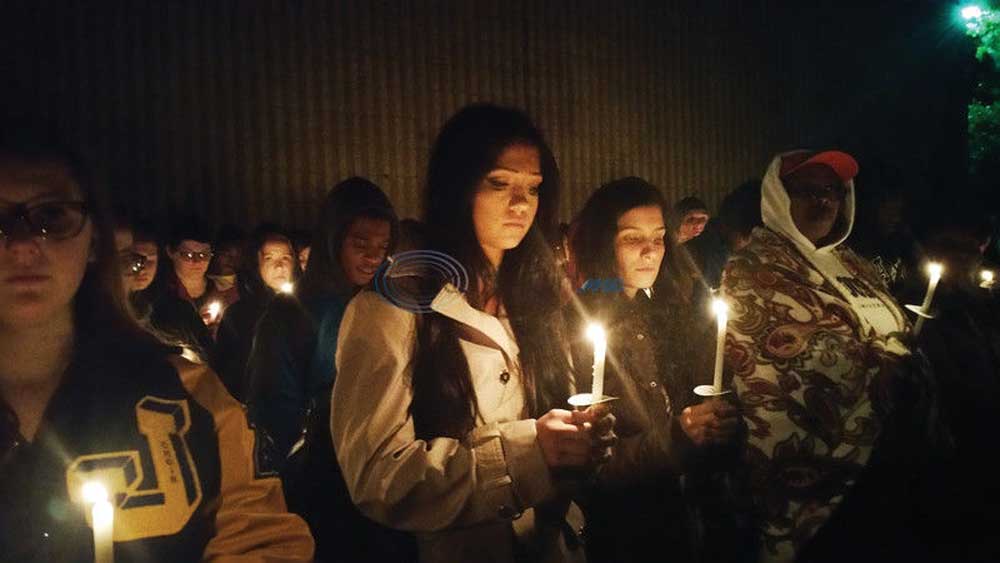200 spend a cold night out to learn about homelessness
Published 11:06 pm Thursday, November 12, 2015

- Erin Blaine, left, and Olivia Martin spent Thursday night without a home in Bergfeld Park to simulate the experience of homelessness. Throughout the night, the ladies reiterated how privileged their normal lives were.(Cory McCoy/Staff)
More than 200 East Texans felt the bitter sting of homelessness on Thursday.
The annual One Night Without A Home event returned to Bergfeld Park to give participants a look at what it’s like to be homeless.
Participants spent the night with just a sleeping bag, some cardboard and the clothes on their back. They were barred from bringing food, electronics and even camping gear. Of course, they did have some luxuries that the homeless are not guaranteed, such as police protection and a meal at the beginning of the event.
Christina Fulsom, of the East Texas Human Needs Network, said the event was designed to pull back the curtain on Tyler’s homeless population.
“Homelessness exists everywhere, often if you’re not attuned to it, you don’t see it,” Mrs. Fulsom said. “We have homelessness issues here just like everyone does. Most people don’t realize it, because they don’t see it.”
Mrs. Fulsom said on any given day, the homeless population in Tyler is more than 470 people. Also, 18 percent of the homeless in the area are children.
“We’re making great strides, we have less falling into chronic homelessness, and they stay homeless for less time, but sadly the number of children went up,” she said.
During a census conducted by her organization in January, the number of children without homes saw a 3 percent increase.
Dr. Deb Kelley, a psychology professor at Tyler Junior College, returned for the event for her fifth year. The first year, she encouraged students to go; the next year, she realized if students saw it was important to her, they also would value the experience.
“This is something I can’t teach. The ah-ha moments are priceless,” Dr. Kelley said.
“It gives them an idea of who the homeless really are. You have this perception; it’s kind of this perception in a vacuum. It’s someone with a piece of cardboard, but these are real people, and they have real need. They’re going to hear from these people tonight, and it’s going to cause them pause.”
The issue of homelessness is close to Dr. Kelley’s heart. She first became passionate about the issue when she was practicing.
“A man came in for treatment, and he had the clothes on his back,” Dr. Kelley said. “He had no toothbrush; he had no way to brush his hair. Nothing. That impressed on me. Through the years, my understanding has developed.”
One Night Without a Home not only highlights the drastic difference in perception most people have when thinking about homelessness in Tyler, but also shows participants how they can help.
“The majority of those participants are students, so they’re very young people in college trying to determine what they want to do for the rest of their lives,” Mrs. Fulsom said. “We hope we’re influencing their decisions, because once you know, you can’t unknow.”
During the provided meal at The Salvation Army, a group of TJC students shared that they had chosen not to eat – further simulating what it’s like to be homeless. One was a vegetarian; something the girls said made them feel immensely privileged, because they knew a homeless person wouldn’t be able to have that choice.
The girls discussed the conveniences in their lives before coming to the conclusion they would never truly understand exactly how the homeless felt, due to their good fortune. But they said that awareness helped them come closer to empathy.
During the event, participants watched the documentary “Storied Streets,” which highlights the struggle of homelessness. Mrs. Fulsom said newly homeless people often harbor shame and attempt to hide it from the people in their lives.
“Families are fearful that Child Protective Services will take their children away,” she said. “They’re couch surfing, living in a vehicle or a home no one should live in. You could be working with them or going to church with them and never know.”
There are ways to help, though. Organizations like The Salvation Army, East Texas Human Needs Network and many others provide East Texans with ways to help support those most in need in their communities.
For more information, visit ethnn.org.
TWITTER: @TMT_Cory






